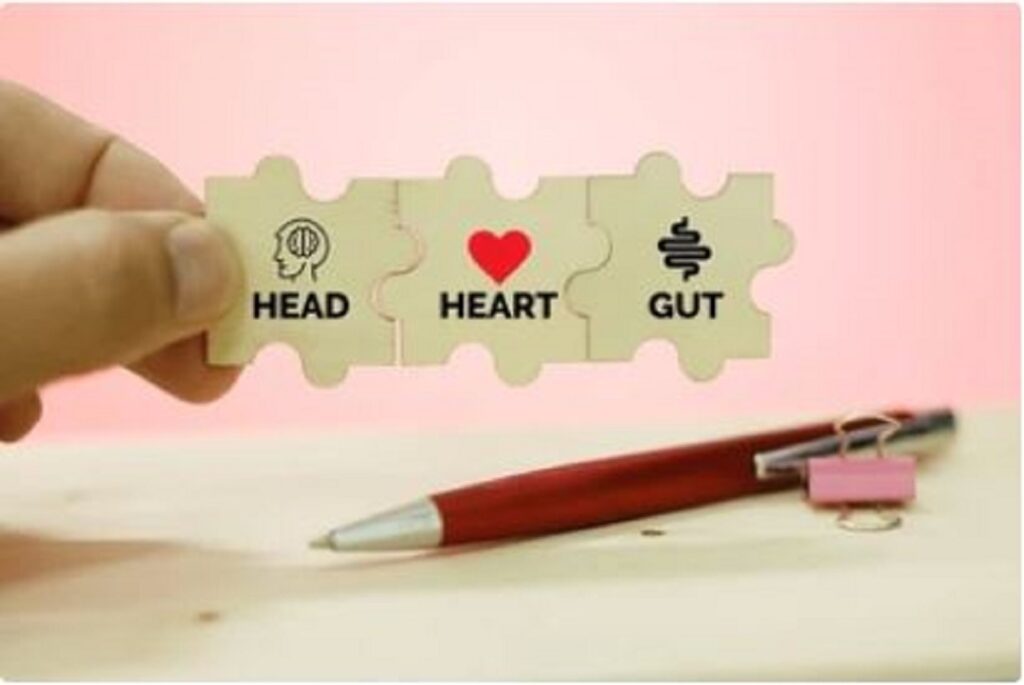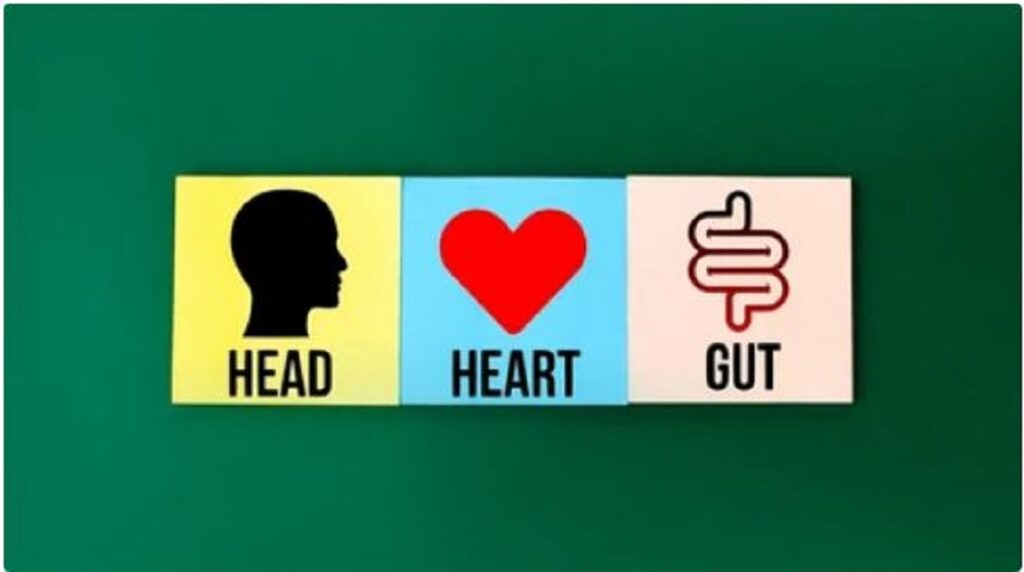

Table of Contents
Head Brain, Heart Brain & Gut Brain
When we speak of the “brain,” most people think of the organ inside the skull. However, modern neuroscience, psychology, cardiology, and gastroenterology recognize that intelligence and regulation of human life are not confined to the head brain alone. The “Heart Brain” and “Gut Brain” play equally significant roles in shaping our physiology, psychology, and overall health. Let us examine this from the perspectives of a neurologist, psychologist, cardiologist, and gastroenterologist.
The Head Brain (Cerebral Brain)
Neurologist’s Perspective
The head brain, or central nervous system (CNS), comprises approximately 86 billion neurons and controls thought, perception, memory, movement, and consciousness.
It communicates through electrical impulses and neurotransmitters, serving as the command center for sensory input, motor output, and higher cognition.
Prefrontal cortex governs decision-making, limbic system regulates emotions, and brainstem maintains vital functions like breathing and heartbeat.
Disorders: Stroke, Alzheimer’s disease, Parkinson’s disease, epilepsy.
Psychologist’s Perspective
The head brain processes cognition, emotions, learning, and memory.
It regulates personality, consciousness, creativity, and stress responses.
Over activity of certain brain circuits leads to anxiety, depression, or obsessive-compulsive disorders.
Mind-body therapies like meditation and cognitive-behavioral therapy (CBT) help in retraining these circuits.
The Heart Brain (Neuro-cardiology Perspective)
Cardiologist’s Perspective
The heart is not merely a pump; it contains about 40,000 intrinsic neurons, often called the “heart brain.”
Through the intrinsic cardiac nervous system (ICNS), the heart communicates bidirectionally with the head brain via the vagus nerve and sympathetic fibers.
Heart rhythm affects brain function:
Heart Rate Variability (HRV) reflects emotional regulation and stress resilience.
Coherence between heart rhythms and brain waves enhances clarity, decision-making, and emotional balance.
Disorders: Arrhythmias, stress cardiomyopathy (Takotsubo syndrome), hypertension, ischemic heart disease—often linked with emotional and neural dysregulation.
Psychologist’s Perspective
Emotions like love, compassion, and grief are often “felt” in the heart region because of this neurological connection.
Studies show that positive emotions improve HRV, whereas chronic stress suppresses it, predisposing individuals to cardiac illness.
Heart-brain coherence techniques (breathing, meditation, gratitude practices) optimize both cardiovascular and psychological health.
The Gut Brain (Enteric Nervous System)
Gastroenterologist’s Perspective
The gut harbors the enteric nervous system (ENS), with over 100 million neurons, sometimes called the “second brain.”
It regulates digestion, nutrient absorption, motility, and secretion, independent of the head brain.
The gut microbiota influences brain chemistry by producing serotonin, dopamine, GABA, and other neurochemicals.
Disorders: Irritable Bowel Syndrome (IBS), Inflammatory Bowel Disease (IBD), dysbiosis—all closely associated with anxiety, depression, and neurodegenerative conditions.
Neurologist’s Perspective
The gut-brain axis operates through the vagus nerve, hormones, and immune mediators.
90% of the body’s serotonin originates in the gut, explaining the close link between digestion and mood regulation.
Emerging studies show gut microbiome imbalance contributes to Parkinson’s disease, autism, and depression.
Integrated View: The Triune Intelligence Network
The Head Brain = cognitive intelligence, reasoning, logic.
The Heart Brain = emotional intelligence, empathy, intuition.
The Gut Brain = instinctive intelligence, survival drive, “gut feelings.”
Holistic Connection
These three brains constantly communicate. A stressful thought (head brain) increases heart rate (heart brain) and alters gut motility (gut brain). Conversely, gut dysbiosis can lead to anxiety, which affects heart rhythm and cognitive clarity.
Healing strategies must therefore integrate neurological, psychological, cardiac, and gastrointestinal care.
Clinical and Philosophical Implications
Neurology: Neuroplasticity shows that all three brains can be retrained for resilience.
Psychology: Balancing thought, emotion, and intuition creates mental harmony.
Cardiology: Heart coherence enhances not only cardiovascular function but also emotional stability.
Gastroenterology: Maintaining gut microbiota diversity safeguards both mental and physical health.
Practical Applications for Health
Diet & Gut Care → Probiotics, fiber-rich foods, avoiding processed toxins.
Heart Coherence Exercises → Deep breathing, meditation, gratitude journaling.
Brain Training → Learning, mindfulness, stress management.
Lifestyle Integration → Yoga, Ayurveda, balanced sleep, physical activity.
Conclusion
The concept of Head Brain, Heart Brain, and Gut Brain reveals a profound triune intelligence system. Recognizing these interconnections allows us to understand human health not just mechanically but holistically. As a neurologist, psychologist, cardiologist, and gastroenterologist would agree: true wellness arises when cognition, emotion, and instinct are harmonized.


